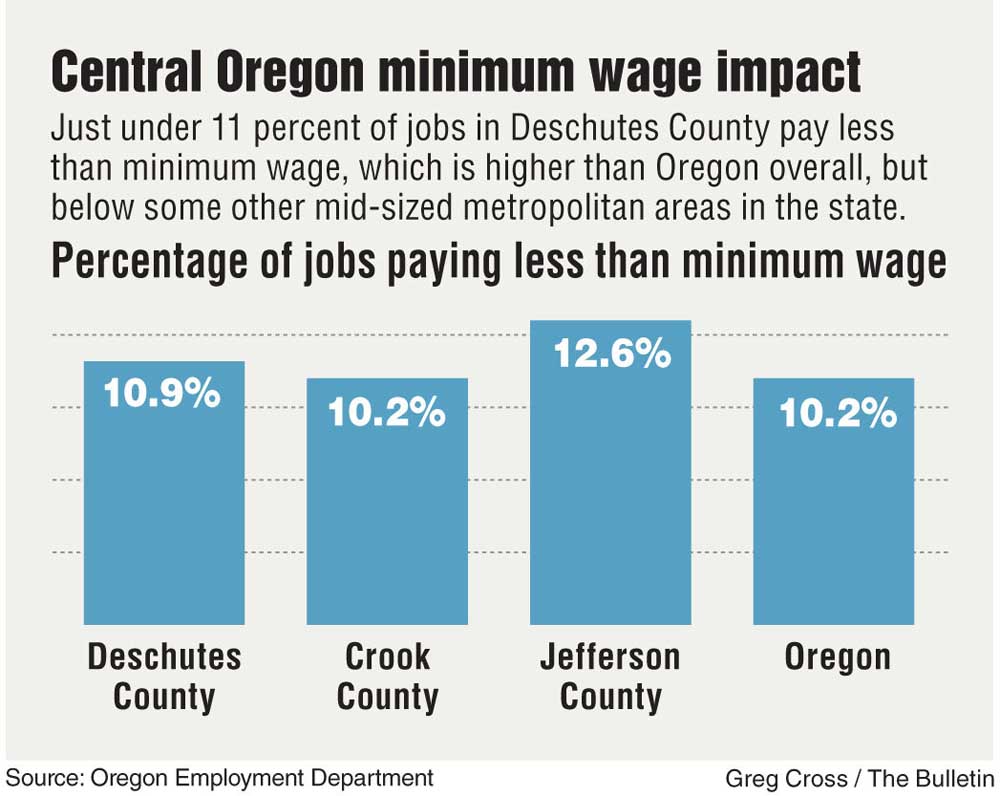How will a higher minimum wage affect Central Oregon?
Published 12:00 am Thursday, March 24, 2016

- How will a higher minimum wage affect Central Oregon?
The overarching narrative in Central Oregon has been that the region’s economy, which relies heavily on the tourism industry, is more susceptible to job losses from a sharp increase to the minimum wage than other parts of the state.
However, a recent article from the Oregon Employment Department suggests that it might not be as significant as originally feared, at least right away.
The article, titled “Minimum Wage Impact on Central Oregon,” examined the impact on workers who will be directly affected by the increases from Senate Bill 1532, which will go into effect across Oregon on July 1.
The bill will raise the current statewide minimum wage from $9.25 an hour to $9.50 in rural counties like Crook and Jefferson, and to $9.75 in urban counties such as Deschutes. It’s the first of seven increases scheduled to take effect every July 1 through 2022.
According to the study, 10.9 percent of the jobs in the Bend-Redmond Metropolitan Statistical Area, which comprises all of Deschutes County, pay less than the minimum wage on July 1, compared to 10.2 percent in Oregon overall.
However, in comparable Oregon metro areas, including the Eugene-Springfield MSA and the Medford MSA, the rates were higher, at above 12 percent in both cases. According to numbers from the first quarter of 2015, Deschutes County had the sixth lowest percentage of jobs that pay $9.25 an hour or less in Oregon, at 5.6 percent.
“I expected us to be much higher than the state overall,” said Regional Economist Damon Runberg, the article’s author, referring to Deschutes County.
The county has a relatively high percentage of tourism jobs that pay above minimum wage but less than $15 per hour. However, Runberg said true minimum wage tourism jobs are less common.
“I think the stereotype is that every single tourism job pays exactly minimum wage, and that’s not the case,” Runberg said.
The Bend-Redmond MSA also has comparatively few entry-level retail jobs. In 2014, the Bend-Redmond metro area had 1,744 food and beverage store jobs, compared to 4,157 in the Eugene-Springfield MSA, and 2,680 in the Salem MSA, which consists of Marion and Polk counties.
The impact of the law on workers who earn less than $15 an hour remains to be seen. Jeff Robberson, president of Robberson Ford and chairman of the Legislative and Advocacy Committee for the Bend Chamber of Commerce, said raising the minimum wage could lead to other positions seeing wage increases as well.
“The effect this will have on wage creep is something we’re concerned about,” Robberson said.
Runberg said that, historically, that has not happened with other minimum wage increases, though he acknowledged that there is no clear precedent for this type of statewide increase.
Runberg’s article suggested that the change might not be a drastic one for rural Oregon. The minimum wage in rural counties will increase by $3.25 an hour by 2022. By comparison, it rose by around $2 over the previous eight years, when it was tied to inflation.
However, Roger Lee, executive director of Economic Development for Central Oregon, said the gradual increase could still alienate businesses.
“You can characterize it as boiling a frog by degrees,” Lee said.
— Reporter: 541-617-7818, shamway@bendbulletin.com






